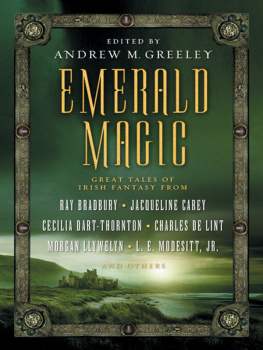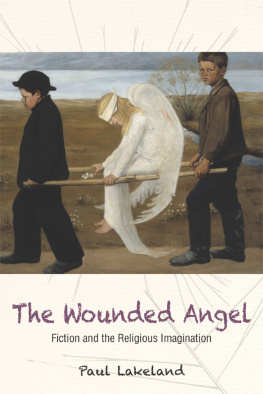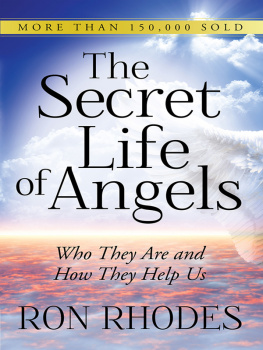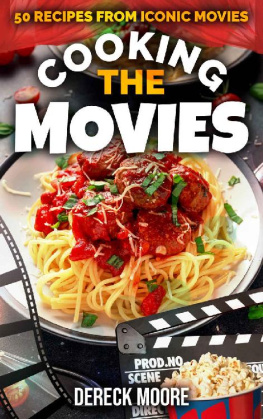The authors of this book are quite right that most people are blind to the religious symbolism in the movies they see. They do not look for God when they go to the movies, although it would be odd indeed if She (as Andrew Greeley often refers to Him) was not reflected in the dominant art form of the twentieth century. Recently I have been engaged in a running battle with those who feel Martin Scorseses Bringing Out the Dead is one of his lesser filmseven a failure. I believe it belongs with the best of his work. What has amazed me in my discussions is that no one ever refers to the spiritual content of the film, and yet it is specifically Christian from beginning to end, and not just because its action incorporates the cardinal acts of mercy and all of the seven deadly sins, takes place over three days and has a Christ-figure for its hero. It is Christian because it considers with the question of what a good man can accomplish in a world that seems to be the devils playground. (It is not a coincidence that the action all takes place in Hells Kitchen.)
The film was written for Scorsese by Paul Schrader, the author of all his most specifically religious work (Taxi Driver, Raging Bull, The Last Temptation of Christ). Schrader is a Calvinist by birth and upbringing, a man occasionally overtaken by clouds of gloom and the conviction that he has made his last film, that there is no longer room for his work in todays crass commercial climate. One day a few years ago, as we sat in the shade of some California trees, he said that he and Scorsese were existentialists in an age of irony. Im really of the existential tradition, the twentieth century tradition, he said. Tarantino is tying into the ironic hero. I know the existential heros in trouble and I know this century is almost over. But I dont know how nourishing the ironic hero can be....The existential dilemma is, should I live? And the ironic answer is, does it matter? Everything in the ironic world has quotation marks around it. You dont actually kill somebody; you kill them. It doesnt really matter if you put the baby in front of the runaway car because its only a baby and its only a car.
The film he was working on just then was Touch, an adaptation of an Elmore Leonard story about a stigmatic, a former Franciscan, who can help people by touching them. I honor Schraders impulse in making it. It basically asks: What do you do when your religion calls your bluff and turns out to be real, and you cant get away with safe, middle-class piety any more, but are called to behave like those fanatics in the Lives of the Saints? How then should you behave in the real world? A woman in the heros life offers to do his laundry, and then pauses, and wonders if its all right to put stigmatic blood through the wash.
The films considered by Andrew Greeley and Albert Bergesen in this book all put the blood through the wash, in one way or another. They dare to consider the divine in the context of the carnalnot only in their stories, but in their very form, which is the Hollywood entertainment film. Most people, as the authors observe, do not consider these movies from a religious point of view. Even when a character is clearly considered to be God, as Audrey Hepburn is in Always, most audiences, I imagine, think of her not as God but as God, a character in a movie. Or as an angel, which was my impulse. One of the most awesomely spiritual films I have ever seen is Lars von Triers Breaking the Waves, in which, as Greeley observes, the dour Scottish church elders remove the bells from their church tower as too festive, and get their comeuppance when the peals of celestial bells ring out from the very heavens. The impact of this film was so powerful that when it premiered at the Cannes Film Festival, one of the American critics, from a very secular New York weekly, fled to the ladies room in tears. Janet Maslin of the New York Times went in to comfort her, and both were locked inside the Palais des Festivals. Yet when the film went on to win prizes at Cannes and Academy Award recognition, most of the reviews described the frankness of its sex, not the frankness of its spirituality. It was as specifically and obviously and deliberately spiritual as any film I can think of, but it was not discussed in those terms.
Maybe we are embarrassed to discuss religion and the movies at the same time. Perhaps when we have spiritual experiences we translate them into mundane terms as quickly as we can. I know that I have been shaken to the depth of my existence by a few movies (Do the Right Thing, Cries and Whispers, and Ikiru for example), and I also know that even broadly popular films like Ghost, Field of Dreams, and The Sixth Sense got people worked up. The studios can never understand it when a film like The Sixth Sense, which is mostly downbeat, contemplative, and deliberately confusing, attracts enormous audiences and repeat business. It is because it gives people something to talk about and think about, and they appreciate it. One of the values of this book is that it considers the ways in which those films may have touched many of the members of their audienceswhether they were prepared to admit it or not.
Andrew Greeley and I have conducted a long-running discussion about God and the movies over the years. Not long ago we were sitting late in a Middle Eastern restaurant near the Michigan shore, lamenting the inaccuracies of so many of the movies about angels. (Whenever an angel appears in a movie and starts talking about how long hes been waiting for a pizza, I want to take him aside and break the news that as an angel he is not a reincarnated human as Hollywood seems determined to believe, but a spiritual being who never has and never will possess the equipment to eat a pizza. Wings of Desire has it rightyou have to turn in your wings, and along with the pizza you have to accept such human indignities as disease and death.)
Greeley told me about his university courses on God in the movies, and indeed I think the course had its inspiration in his thoughts after seeing









